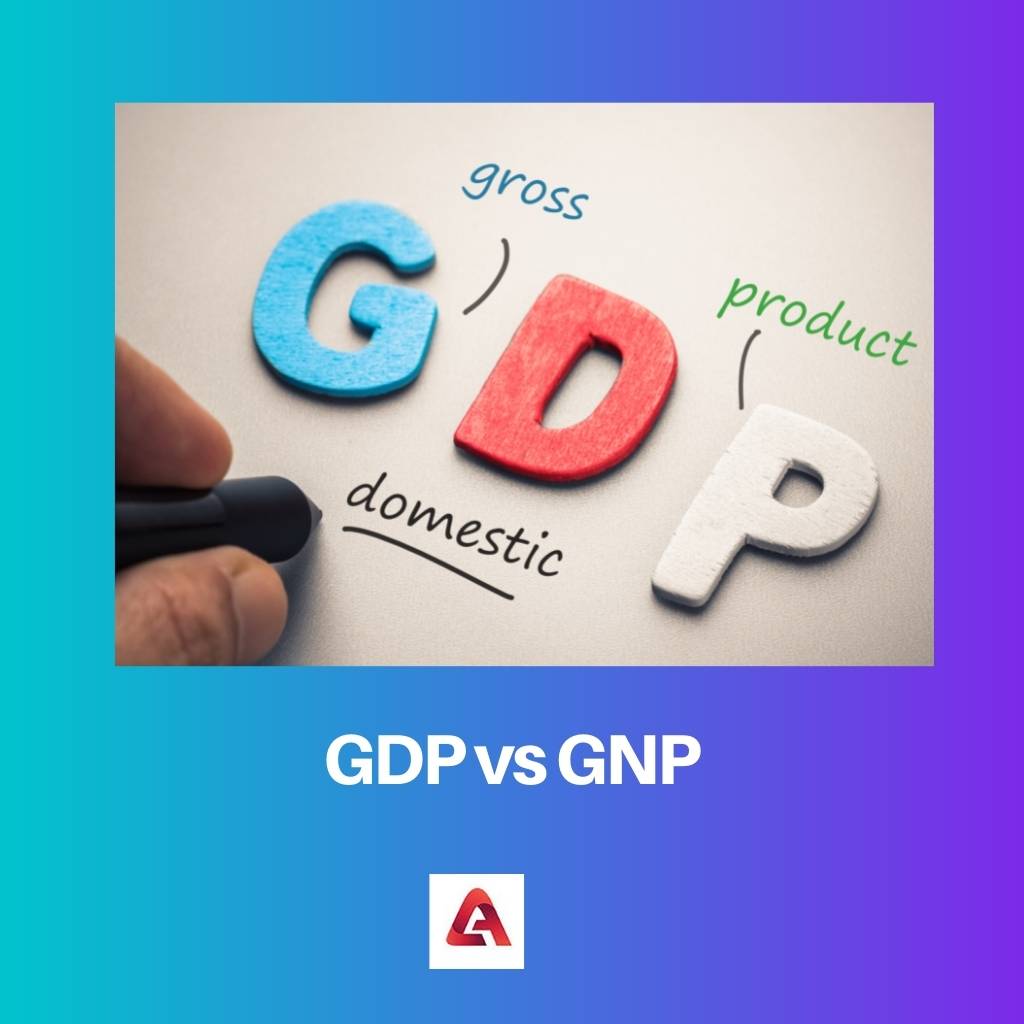In the present-day world, it is not uncommon to stumble across these two words, GDP and GNP, often. GDP, which stands for Gross Domestic Product.
Key Takeaways
- Gross Domestic Product (GDP) measures the value of goods and services produced within a country’s borders. In contrast, Gross National Product (GNP) measures the total value of goods and services a country’s residents produces, regardless of location.
- GDP focuses on the production location, while GNP focuses on the nationality of producers.
- GDP is commonly used for international comparisons, while GNP is used to analyze a country’s overall economic health.
GDP vs GNP
The difference between GDP and GNP is quite easy to comprehend as GDP is measured within a country’s defined boundary, whereas GNP is calculated by taking into report both domestic and foreign monetary activities. These two phrases have some other little differences, too, based on how foreign and non-residential citizens’ income is evaluated.

GDP is the metric that’s most commonly used to measure the economic growth and present size of a country’s economy. It is the total monetary value of the finished commodities, goods, and services produced within the boundaries of a nation (domestically) over a specific time phase, and mostly it’s measured yearly.
GNP, on the other hand, is the procedure to compute the monetary growth of a country made by all of its citizens residing both within and outside the country. For instance, an Indian resident working in the United States can contribute to the country’s GNP if he has citizenship in India.
Comparison Table
| Parameters of difference | Gross Domestic Product | Gross National Product |
|---|---|---|
| Boundary | It is measured within the boundary of a country | It is measured both within and outside the boundaries of a country |
| Non-residential citizens | Non-residential citizens contribute to a country’s gross domestic product | Non-residential citizens will not contribute to a country’s Gross National Product unless they have dual citizenship |
| Foreign citizens | Foreign citizens income is included as a part of Gross Domestic Product if they work within the country. | Foreign citizens income is not included in a countries GNP. |
| Ownership | Companies\factories within a country boundary contribute to gross national product irrespective of ownership | Companies belonging to a particular country contributes to their Gross National product, irrespective of who works in it. |
| Formula of calculation | GDP = consumption + investment+ spending by government + exports | GNP = GDP + (money flow IN foreign countries – money going TO foreign countries) |
What is GDP?
The GDP of a country is the consumption, investment, government spending and exports within a country’s boundary. Non-residential citizens who send their money to their own country contribute to the GDP of their country.
The rather simple method to calculate GDP is the sum of consumption, investment, and spending by the government, which also includes the other expenditures made by the government. It is one of the most important systems to calculate a country an economic activity and growth and also reflects the living standards of the people of that very country.
Foreign citizens who own a company or their own industry within the territories of India also pay to the government is included in the country’s GDP. GDP is mainly of four varied types which include – Real GDP followed by nominal GDP, then comes actual GDP and finally possible GDP.
Taking a simple example, if a Miniso store is present within India, it contributes to India’s GDP while it pays taxes to the government. Also, Indian employees working in that store, when spending money inside the country, contribute to GDP.

What is GNP?
The term GNP implies the accumulated amount of consumption, along with investment, exports and expenditure of the government. This includes actions both within and outside of the border of a country.
The simple words GNP is the sum of GDP and the money flowing into another foreign country (belonging to this country) and negating the money flow to a foreign country). GNP is mainly derived from the GDP.
Based on the formula, we can say that the income of foreign residents isn’t included in the country’s GNP even if they invest it within that same country. It becomes the GNP of the country they originally belonged to.
Taking an example to explain this concept of GNP, if an Indian citizen lives in the United States and has citizenship of India, all earnings by him are included in the GNP of India.

Main Differences Between GDP and GNP
- The gross domestic product includes the economic values of all finished goods and services that are done within the boundary of the country.
- The income by non-residential citizens when sending their money into their own country promote the GDP growth of their own country. In contrast, non-residential citizens do not contribute to the GNP of their own country.
- Foreign citizens who work in a company present in another country contribute to the GDP of that country. however foreign citizens’ income isn’t considered while calculating GNP
- Industries, companies and factories present inside the country contribute to its GDP irrespective of ownership. Whereas industries, companies and factories owned by the citizens of a particular country contribute to its GDP, respective of its location.
- Gross Domestic Product is calculated using the formula –
GDP = consumption + investment+ spending by government + exports.
Gross national product is measured by the formula – = GDP + (money flow IN foreign countries – money going TO foreign countries.

- https://www.sciencedirect.com/science/article/pii/S0301421501000179
- https://www.researchgate.net/profile/Jannatul-Bristy/publication/314484207_GDP-GNP_Gap_Trade-Off-is_it_Significant_for_Economic_Performance_Review_of_World_Economies_Having_Both_Gaps/links/5d09b0f7a6fdcc35c1592fa7/GDP-GNP-Gap-Trade-Off-is-it-Significant-for-Economic-Performance-Review-of-World-Economies-Having-Both-Gaps.pdf

The comprehensive comparison table truly clarifies the divergent calculations and implications of GDP and GNP.
Absolutely, Arthur. The table succinctly outlines the operational disparities between these indicators.
Understanding the nuances of GDP and GNP calculations contributes to a comprehensive view of a nation’s financial landscape.
You’re absolutely right, Mark. It’s imperative for policymakers and economists to interpret these nuances accurately.
This intricate exploration of GDP and GNP substantiates the pivotal role of these metrics in evaluating economic performance and growth.
Absolutely, Oliver. Deep comprehension of these metrics is indispensable for insightful economic analysis.
It’s important to understand the difference between GDP and GNP, to properly evaluate a country’s economic health & prosperity.
I completely agree with you, Cmason. This evaluation can help us understand the dynamics of the economy better.
An insightful discussion on the differences between GDP and GNP. This understanding is crucial for informed economic assessments.
Indeed, Wendy. This comprehension enhances the capacity for effective economic analysis and decisions.
Understanding the specific components and effects of GDP and GNP on a nation’s economy is deeply enlightening.
Indeed, Yasmine. Analyzing these components can yield valuable insights into economic trends and performance.
The detailed comparison provides a broader view of the intricate differences between GDP and GNP calculations.
Indeed, Vanessa. A nuanced understanding is critical for comprehensive assessments of economic health.
Absolutely, Vanessa. Delving into the specifics enables better comprehension of these economic metrics.
The economic significance of GDP and GNP is underscored by the subtleties presented within the comparison, aiding in informed financial analysis.
Absolutely, Stefan. These distinctions are pivotal in comprehensive economic evaluations.
Precisely, Stefan. These differences contribute to a more holistic understanding of economic landscapes.
The concise explanations about GDP and GNP serve to enhance our economic knowledge and analytical capabilities.
Precisely, Odavies. The depth of understanding these concepts can significantly enhance economic assessments.
Absolutely, Odavies. Familiarity with these economic metrics strengthens our ability to interpret economic data accurately.
The distinction between GDP and GNP is fundamental for international economic analysis.
Exactly, Ashley. Each metric provides unique insights into a country’s economic activity and growth.
Indeed, these distinctions are crucial in understanding the economic influence of internal and external factors.